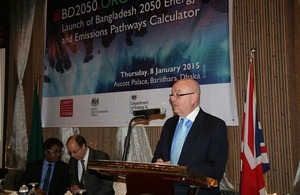UK-Bangladesh collaboration charts Bangladesh's energy futures
The British High Commissioner to Bangladesh Robert W Gibson launched the Bangladesh 2050 Energy Pathway's Calculator (BD2050) in Dhaka.

The High Commissioner to Bangladesh Robert W Gibson launched the Bangladesh 2050 Energy Pathway's Calculator (BD2050) in Dhaka.
The UK Government Department for Energy and Climate Change (DECC) and Cardiff University, at a reception tonight hosted by the British High Commissioner in Dhaka, launched the Bangladesh 2050 Energy Pathway’s Calculator (BD2050).
Bangladesh 2050 Energy Pathway’s Calculator (BD2050) is the first ever online software model integrating energy generation and usage tied to carbon emissions and the use of land in Bangladesh. Available to the public, users can try and balance energy sources against energy demand between now and 2050 and see what impact that will have on the country.
The BD2050 calculator was funded by DECC and developed by a British team of researchers and specialists led by Dr Monjur Mourshed, at the University of Cardiff in the UK. Support for the project came from Bangladesh Ministry of Power, Energy and Mineral Resources (MPEMR).
The reception was an event held as part of Gbeshona Conference for Research on Climate Change in Bangladesh.
At the launch the British High Commissioner, Robert W Gibson CMG, said “the Calculator is an opportunity for all sectors of society to influence, debate and lobby for the type of future they would like for their country and, more importantly, for their children and beyond”.
Dr Monjur Mourshed from Cardiff University told the audience, “BD2050 is designed to enable the Bangladesh Government and the public to explore high-level energy, economy and emission pathway options and their impacts on land-use, electricity, energy security and food.”
Jan Kiso, from the UK’s Department for Energy and Climate Change said “the ‘ground-breaking’ 2050 analysis shows that in all future scenarios there will be an unprecedented growth in the demand for energy, compounded by the growth in population and economy. Energy security will be challenged by the need to retain as much agricultural land as possible for the production of food instead of cultivating bioenergy crops. Pressures from urbanisation, scarcity of land, and climate change impacts are likely to limit the choice of pathways”.
Dr. Saleemul Huq, Director, International Centre for Climate Change and Development said at the launch “even though Bangladesh’s own emissions of greenhouse gases are presently low, nevertheless as a good global citizen it must find ways to develop on a low Carbon development pathway. The Carbon Calculator developed with British assistance is an excellent tool to help Bangladesh plan such a low carbon development pathway”.
It is hoped that the calculator will provide a better understanding for Bangladeshi researchers and decision makers in the impact of energy choices made today and how they will influence future energy, economic and food security needs. The Calculator will also help to highlight the need for a legally binding and universal agreement on climate, from all the nations of the world at the Conference of Parties in Paris this December.
Notes to editors:
- The BD2050 calculator is an open source energy and emissions model of Bangladesh. it allows the user to explore all high-level energy, economy and emission pathway options the country faces. For each possible 2050 pathways the user can further investigate impacts on land-use, electricity, energy security, food production and intake.
- The BD2050 calculator is developed at Cardiff University, UK by a team of researchers led by Dr Monjuur Mourshed, with support from the Ministry of Power, Energy and Mineral Resources (MPEMR), Bangladesh, the Department of Energy and Climate Change (DECC), UK and the British High Commission, Dhaka.
- The BD2050 calculator is the 11th Calculator to be launched by DECC and is the only Calculator developed for a Least Developing Country.
- The BD2050 calculator exists in two formats:
- The BD2050 Excel spreadsheet: A detailed spreadsheet outlining all the underlying data and functionality of the 2050 calculator. Intended for expert users for evidence based policymaking.
- The BD2050 Webtool (http://calculator.bd2050.org): Internet based scenario model using the same data as the excel spreadsheet. The user is able to get instant results showing information on energy output, demand and emissions out to 2050, It enables quick comparison of the consequences and trade-offs of different scenarios.
- British initiatives: the UK is committed to helping Bangladesh adapt to climate change and protect the lives and livelihoods of 15 million vulnerable Bangladeshis, increasing their resilience and improving their ability to respond and recover from natural disasters through improved early warning systems.
- International agreement: the United Nations Climate Change Conference will be held at Le Bourget in Paris, Frances from 30 November to 11 December 2015. It will be the 21st yearly session of the Conference of the Parties (COP 21) to the 1992 United Nations Framework Convention on Climate Change (UNFCCC), and the 11th session of the Meeting of the Parties (CMP 11) to the 1997 Kyoto Protocol. The conference objective is to achieve a legally binding and universal agreement on climate, from all the nations of the world.